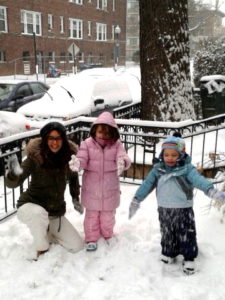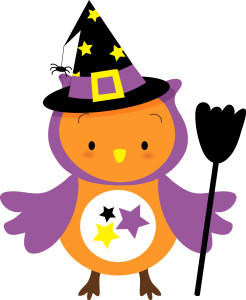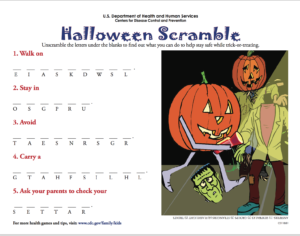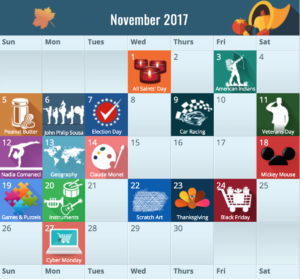Thanksgiving is celebrated on the fourth Thursday of November each year. Even though a few other countries also celebrate Thanksgiving, it’s still considered a uniquely American holiday, one that the au pairs look forward to experiencing. You can learn more about it here. Continue reading
Yearly Archives: 2017
Veterans Day 2017
Each year, we recognize our Veterans on November 11th, the day that World War I ended in 1918. Today, there are over 19 million Veterans in the United States. We all have a family member, friend, neighbor, or host parent who has served or is currently serving in the military. Continue reading
It’s Cold! A Guide to DC Winter Weather
When I moved to DC from the warm South Carolina coast for graduate school, I refused to believe that winter weather would actually arrive and (even worse) stick around for several months.
That first September, I was confused by the empty hooks hanging in the back of all of the classrooms. I couldn’t imagine that in a few short months each hook would be holding a winter coat.
In October, I ignored the racks of coats and stacks of sweaters displayed in all of the stores. My lightweight jacket and jeans seemed to work just fine.
In November, I dashed to and from the car, grateful for the warmth and heat inside my house and university. “It’s just a cold snap,” I told myself.
And then it snowed.
I watched my neighbors shovel their sidewalks and head off to work. I checked the university website and was shocked that classes hadn’t been canceled. December had arrived and I was living in DC without a hat, gloves, scarf, or boots. I slipped and slid my way to my car, carefully drove to Nordstroms (marveling at the snow plows clearing the roads), and bought the only pair of snow boots left in the store.
Seventeen years later, my closet is fully stocked with coats and everything else necessary to live, work, and play in the winter. Because that’s the biggest lesson I’ve learned about living in a city with winter weather- unless we have a blizzard, people go outside in the cold weather. In fact, they even have fun outdoors.
Children love to play in the snow- and they need the exercise. Staying cooped up inside only leads to grumpiness and fights. It’s much more fun to stay outside and build a snowman. Au pairs need to be prepared to join in the excitement.
For those of you not used to this weather, I understand your dismay. However, I encourage you to take advantage of this unique experience. Embrace the cold weather months as a chance to wear sweaters, try out a pair of gorgeous boots, and experience the snow. The au pair year is over very quickly, and before you know it, you’ll be home again showing your friends and families pictures of the first snowman you ever built.
Important Tips*

Photo credit: Catherine McEaddy Holmes
Dress in Layers – Consider buying sweaters, jackets and long underwear. If you wear several layers, you can take off things to be comfortable. For example, when it might be too warm for a heavy jacket, but too cold for just a sweater, you can combine different pieces of clothing.
Set a Good Example – Host parents will expect you set the example for your kids by wearing a coat when it is cold outside. You should have a winter coat, hats, gloves, boots, and scarves. Your host kids will fight wearing a coat if you don’t wear one. Think of yourself as a celebrity and everyone wants to look like you — especially your kids.
Check the “Emergency Change of Clothes” – With young children, we often keep an emergency change of clothes in the car, diaper bag or at their school. If you haven’t already switched out the shorts and t-shirt for something warmer, now is the time to do it.
Buy Cold Weather Clothing Now – Many stores have sales this time of year. Target, T J Maxx, WalMart, and Macy’s have lots of outdoor gear in their stores. DSW has tons of warm and stylish boots and has many DC-area locations, including Columbia Heights, Friendship Heights, and Georgetown. Lands End and Amazon are great online alternatives. An even more affordable option would be to go to a thrift shop. There are many in the area and you can often find a very warm jacket for a small price compared to buying one new.
Monitor School Closings and Delays– Because DC doesn’t get as much snow as the Alps, school is often canceled or delayed when it snows just a little. Au pairs from Germany, Poland, and other cold-weather countries will laugh at the DC area’s dysfunction in the winter ice and snow. Talk with your host family now, so you can all understand the plan for these inevitable schedule changes.
(*Important Tips includes information first posted on Christine Connally’s Au Pair Chatter blog. )
Fashionably Winterized
It’s possible to look great and still be warm. Here are a few articles to inspire you:
-
Forget Weather.com: Here’s an Outfit Guide For Every Temperature
- How To Look Fashionable While Staying Warm
-
What to Wear When It’s Really Cold: 4 Outfits for Below-Freezing Temperatures
- 6 Winter Fashion Tips for Looking Good When It’s Too Cold to Deal
Au Pair Technology Tips
Imagine if you went to the hospital and the doctors and nurses were more interested in texting or tweeting than caring for you. How would that make you feel, about yourself and about them? Would you think that you were getting the treatment you deserved? Would you feel like paying the bill after your stay?
Life as an au pair is a fine balance between employee and family member. You live with your host family and participate with them as a member of the family, but you also have clear responsibilities as a childcare provider.
Being a childcare provider is a very important job because you are helping to shape our next generation. What message are you sending to your host kids when you would rather interact with a computer than with them? How will they feel about themselves and about you? Children feel as though everything is about them. They will see this as a rejection of them and they will be more likely to act out.
Not paying enough attention to your host kids poses safety concerns too. Accidents happen, but when an adult caregiver is close by and appropriately supervising children, the chances of a major injury are dramatically reduced.
When you are working, you should not do any of the following:
- Texting
- Talking to friends on the phone
- Chatting with friends online
- Using Skype or FaceTime
- Messaging
- Emailing
- Tweeting
- Updating your status on Facebook or any other social media site
- Using Snapchat, WhatsApp or any other app or social media site
- Watching videos on YouTube
- Uploading photos on Instagram
- Playing Pokemon Go
- Using the phone or tablet while driving
- Exceptions- the only time it’s okay to use your computer, phone, tablet, etc. is when your host parents have given your specific permission to text or call them, help your host children find a pre-approved website (like Nickjr.com), or some other job-related task that your host family has asked you to complete. When in doubt- ask your host parents.
Finally, please do not text, scroll through Facebook, answer your phone, etc. when eating meals with your host family or talking with your host parents. Even if you think you’re a great multi-tasker, your host family will think you are being rude.
Going unplugged during work may seem impossible, but think about this — even if you work 45 hours a week, you still have 123 hours left in the week for all of that other stuff, or about 70 hours (if you are getting the recommended 7-8 hours of sleep per night).
Host Parents – Please be clear about what you consider acceptable technology use during work hours to avoid misunderstandings. Your au pair is most likely very accustomed to being plugged in at all times. Her intention is not to be rude, but she might not realize how her actions will be perceived. Please use this information as an opportunity to begin a dialogue on the issue.
(Adapted from Christine Connally’s blog post, Going Unplugged During Work Hours)
Celebrate Halloween 2017!
 Halloween (or Hallow e’en) is a celebration observed in a number of countries including the United States on October 31st. Halloween has a special significance for children, who dress in funny or ghostly costumes and knock on neighborhood doors shouting “Trick or Treat!” Pirates and princesses, ghosts and witches all hold bags open to catch the candy or other goodies that the neighbors drop in.
Halloween (or Hallow e’en) is a celebration observed in a number of countries including the United States on October 31st. Halloween has a special significance for children, who dress in funny or ghostly costumes and knock on neighborhood doors shouting “Trick or Treat!” Pirates and princesses, ghosts and witches all hold bags open to catch the candy or other goodies that the neighbors drop in.
Since the 800’s, November 1st is a religious holiday known as All Saints’ Day. The Mass that was said on this day was called Allhallowmas. The evening before became known as All Hallow e’en, or Halloween. Like some other American celebrations, its origins lie in both pre-Christian and Christian customs.
The most popular Halloween activities include trick-or-treating attending Halloween costume parties, decorating, carving pumpkins into jack-o’-lanterns, lighting bonfires, apple bobbing, playing pranks, visiting haunted attractions, telling scary stories, and watching horror films.
For more information and a “how-to” video on carving a pumpkin, click here. Find more pumpkin carving ideas, scary snacks, and other fun Halloween activities on the APIA Halloween Fun Pinterest board.
Halloween can be a lot of fun but it is also a time when safety should come first. Here are some tips for Monday:
Adult supervision is essential. Always accompany the children if they are going door to door to trick or treat
Try tick-or-treat-friendly homes. Ensure the children only visit houses with lights on. And, you might also suggest the houses they visit have some sort of Halloween decoration on the porch.
Stay outside. Make sure the children don’t go inside someone’s house. They can trick or treat on the porch.
Remain visible. Dress the children in bright costumes or have them wear reflective strips or carry a glow stick or flashlight.
Quality-check treats. Check the candy before they eat it. Throw out any candy that is not in its original wrapper or looks like it has been tampered with.
Say “no” to strangers. Remind the children to never accept a ride or go anywhere with a stranger.
2017 Halloween Safety Tips
Going trick or treating? Check out these tips from the CDC to help make the festivities fun and safe for trick-or-treaters.
Swords, knives, and other costume accessories should be short, soft, and flexible.
Avoid trick-or-treating alone. Walk in groups or with a trusted adult.
Fasten reflective tape to costumes and bags to help drivers see you.
Examine all treats for choking hazards and tampering before eating them. Limit the amount of treats you eat.
Hold a flashlight while trick-or-treating to help you see and others see you. WALK and don’t run from house to house.
Always test make-up in a small area first. Remove it before bedtime to prevent possible skin and eye irritation.
Look both ways before crossing the street. Use crosswalks wherever possible.
Lower your risk for serious eye injury by not wearing decorative contact lenses.
Only walk on sidewalks whenever possible, or on the far edge of the road facing traffic to stay safe.
Wear well-fitting masks, costumes, and shoes to avoid blocked vision, trips, and falls.
Eat only factory-wrapped treats. Avoid eating homemade treats made by strangers.
Enter homes only if you’re with a trusted adult. Only visit well-lit houses. Never accept rides from strangers.
Never walk near lit candles or luminaries. Be sure to wear flame-resistant costumes.

Download the CDC’s Halloween Safety Scramble to review these safety tips with your kids.
November 2017 Calendar Ideas
 Each month, Au Pair in America provides a calendar full of fun activities and helpful information for everyone in the family.
Each month, Au Pair in America provides a calendar full of fun activities and helpful information for everyone in the family.
Education Requirements for Au Pairs
Required Credits
Au pairs are required earn at least six academic credits during their year by completing classes/courses at accredited US post-secondary colleges and universities.
6 academic credits = approximately 8 CEUs = approximately 80 classroom hours
Universities and colleges use several different systems for credits, and au pairs use any combination of academic credits, CEUs, or hours as long as they add up to the required number of hours. (The absolute minimum is 72 classroom hours.)
Accredited Schools
Choosing Classes
Be flexible. Remember that your childcare responsibilities come first. Class schedules need to be arranged with your host family and around your childcare duties. Your favorite class may not be available when you are. Schools vary in what they offer, but most offer a wide range of choices and offer day, evening, and Saturday classes.
The APIA Advantage UCLA Course is the only State Department approved class with an online component. No other online classes are accepted.
Tuition
Your host family will pay an education allowance of $500 to assist you in completing your education requirement. There are a few ways to get your credits for just your education allowance, but choices are limited. Normally au pairs will contribute some of their own money ($200+) towards their education.
Transportation
Your host family will provide transportation, including gasoline, parking, or public transportation costs, to and from your classes in your community until you complete your education requirement.
If the class is remote (out of town), host families pay for the class and what is included; au pairs pay for transportation, food, & lodging.
Education Proof
Submit any of the following as proof of your education:
- Letter from the school on letterhead
- Completion certificate from the school
- School transcript
All proof of education must state your name, school attended, course title, start and end date of the course, and number of credits/hours earned. If your community counselor does not have proof that your education requirement has been completed, you will not receive a completion certificate upon your return to your home country and you forfeit the opportunity to extend.
DCC cluster au pairs should use this link to submit their education proof to their Community Counselor, Catherine.
Extending

Image: NEC Corporation of America (Flickr)
In order to extend, you must show proof that you have completed the education requirement no later than the end of your 11th month.
If you are still in the process of completing your education, you must obtain proof from the school stating that the course(s) you are taking will conclude no later than the end of your 11th month and the number of credits/hours/CEUs that you will earn.
All proof of education must state your name, school attended, course title, and number of credits/hours earned. Completed verification should be given to your community counselor. Your extension request will not be processed without this proof.
Au Pair Healthcare (or what to do if you are sick)
General Information
APIA’s health (medical) insurance plan is administered by Cultural Insurance Service International (CISI) and is part of the Aetna Health Network. It is valid anywhere in the world except your home country. Continue reading
2019 Au Pair Education Options

Photo: William Warby (Flickr)
- APs are required earn at least six academic credits during their year by completing classes/courses at accredited US post-secondary colleges and universities. 6 academic credits = approximately 8 CEUs = approximately 80 classroom hours (72 classroom hours is absolute minimum allowed).
- For a summary of State Department education requirements, click on this link.
- If the class is remote (out of town), HFs pay for the class and what is included. APs pay for transportation, food, & lodging.
- Most courses require homework to receive class credit.
LANGUAGE CLASSES
Georgetown University Evening and Weekend English
- Details: Conversational English courses (weeknights), ESL Business English courses (weeknights), and Advanced TOEFL Test Prep course (Saturdays)
- Credits: 3.2 CEUs for 8-week summer course; 3.6 CEUs for 9-week fall and spring course
- Cost: $480 for summer course; $540 for fall & spring courses (10% Early Enrollment Discount)
- Placement: Mandatory placement test
- Location: Georgetown, DC (Take shuttle from Dupont Circle Metro)
International Language Institute (ILI) English Programs and other foreign languages
- ESL and TOEFL Prep Au Pair Promotion- $500 Tuition for 72-75 hours
- Day Classes (Monday-Friday 9 am-2:10 pm; earn 75 hours in 3 weeks)
- Evening Classes (Tuesday-Thursday 6:40-8:45 pm; earn 75 hours in 10 weeks)
- Saturday Classes (Saturday 9 am-1:05 pm; earn 72 hours in 16 weeks)
- Other foreign languages
- Cost: $75 one-time application fee + tuition (usually offers 10% discount for Au Pairs)
- Schedule: Weekday, evening, and weekend courses offered year-round; foreign language classes begin 4 times per year
- Placement: Testing offered daily
- Location: Dupont Circle (Dupont and Farragut North Metro)
LADO International Institute English courses
- Details: Intensive, Semi-intensive, TOEFL Prep, and TEFL Prep classes
- Credits: 7.6 or 7.2 CEUs for Intensive 4-week program; 7.2 CEUs for Semi-intensive 8-week program, 3.6 CEUs for 8-week Saturday program
- Cost: $85 one-time registration fee + tuition (10% APIA tuition discount usually offered)
- Schedule: Weekday, evening, and weekend courses offered year-round
- Placement: Testing offered daily
- Locations: DC (Archives, Gallery Place, Metro Center), Arlington (Rosslyn Metro), Silver Spring (Silver Spring Metro)
Mentora College Intensive ESL Program
- Details: Intensive 4-week program (ask about a 30% APIA scholarship discount)
- Location: DC (McPherson Square and Metro Center)
GENERAL INTEREST CLASSES
- Details: BMCC offers au pairs two ways to earn educational credits:
- Learning Local: Attend class at Trinity University in DC and then take a study trip to the destination (usually Niagara Falls or Amish Country).
- Credits: 40 hours/4 CEUs, 36 hours/ 3.6 CEUS, or 32 hours/3.2 CEUs
- Cost: Varies by class (check for additional housing and transportation costs)
- Schedule: Learning Local classes meet on Saturdays and Sundays. Study trip dates vary and may include weekdays. Learning Express classes meet over one long weekend on Friday, Saturday, and Sunday. Carefully check class descriptions dates and times.
- BMCC continues to add new courses to its Learning Across America program so make sure to check the schedule regularly!
George Washington University School of Business Women’s Business Leadership
- Details: GWU’s School of Business Center for Entrepreneurial Excellence Women’s Leadership Seminar series
- WBL 101: Intro to Women’s Business Leadership (Fall- Nov 2 and 3, 2019)
- WBL 102: Personal Leadership Journey (Spring- March 7 and 8, 2020)
- Credits: 3 credits/ 36 hours
- Cost: $360 early registration; $385 regular registration + $25 for workbook
- Schedule: TBA (also pre and post-class assignments)
- Location: George Washington University (Foggy Bottom Metro)
University of DC Community College Au Pair Weekend Class
- Details: Learn important skills for dealing with the cultural and personal challenges that international visitors in the U.S. often face and also learn about Washington, DC.
- Credits: Receive up to 45 hours for a 3-day weekend class
- Cost: Varies by course (housing not provided)
- Location: 801 N Capitol St NE (near Union Station)
University of the Virgin Islands International Program (based in DC and other locations)
- Details: Courses that meet for multiple times for several weeks, weekends, or months (include Accent Reduction, ESL Small Talk, Sign Language, art classes, business classes, and more).
- Credits: Between 20-40 hours (2-4 CEUs) and varies by course
- Cost: Varies by course; create student account to register and pay
- Locations: Throughout DC Metro and other locations
Other Classes located at Universities all over the US, including California, New York, Florida, Virginia, Hawaii and others. Click here for more information.
ONLINE CLASS
UCLA Extension American Studies
- Credits: 6 credits
- Cost: $500
- Schedule: September 23, 2019 – February 3, 2020. Course #364702. Registration opens July 29, 2019.
- Location: Online (Note: This is the only online class approved by the State Department and is only available to APIA Au Pairs.)
OTHER DC-AREA OPTIONS
Below is a list of accredited DC-area schools you may wish to research for class options. However, they tend to be more expensive and do not have special programs designed to fit into an au pair’s typical schedule.
American University Nondegree Student (over $1000 per credit)
Corcoran Arts Continuing Education classes (around $1000 per credit)
Georgetown University Visiting Non-Degree Student (over $1500 per credit)
Montgomery College Work Force Development & Continuing Education (must pay non-resident fee)
Prince George’s Community College classes (must pay out-of-state tuition)
This blog post was last updated on 07/13/2019.







